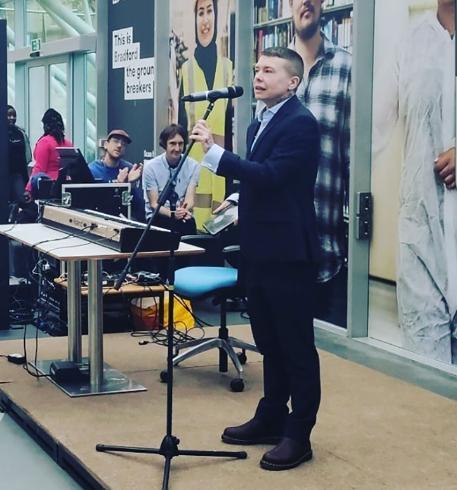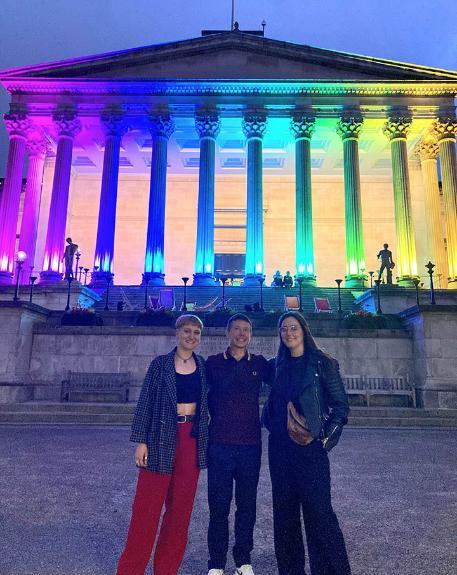Academic Profile - Dr Jack Lopez
LGBTQIA+ health and wellbeing
Can you tell us a bit about your background and what led you to this field of research?
I have been in the area of sexual and reproductive health inequalities for just over 15 years. I am a medical social anthropologist and conduct long term ethnographic research, hence the longevity of my projects. Anthropologists often struggle to draw an end to their fieldwork because human life is forever evolving, so it becomes a question of when is the right and ethical time to step out of people’s lives. Especially when a focus is on inequality and injustice, because these are issues rarely solved by the researcher.
After 10 years researching and writing on reproductive health, intimacy and HIV in Mexico, with the completion of my monograph in 2022 I shifted focus to LGBTQIA+ health in the UK. I employ a collaborative ethnographic approach, developed with a colleague at my previous institution where we ran a 2 year peer research initiative with women asylum seekers. This means that my projects take time in developing relationships with participants and make honest efforts to co-design research and outputs wherever possible. When working with the trans+ community during the pandemic lockdowns I established a working relationship with advocacy organisation Trans Actual UK which continues to this day.

What research are you currently engaged with?
During the 2020-2021 Covid-19 lockdowns I began an online ethnographic study of barriers to trans+ health and pandemic experience in 2020. As an anthropologist I have always been openly and personally connected to my research areas, as a queer academic particularly it is important to have people from our community leading research into the community. Trans people, like many vulnerable and marginalised populations have been historically poorly treated by researchers that lack comparative lived experience and this leads to trust issues.
Having worked internationally throughout my career I was used to some digital/online research when needed, but this was my first time carrying out a whole ethnographic approach from my desk. Working in this way shortened the time normally needed to establish trust relationships in a community, but not being in the same spaces led to physical barriers, including the sensory aspects of data collection I usually employ.
Can you tell us some of the successes and milestones of your research career to date?
From the outset I have had success with public engagement, stakeholder investment and knowledge transfer. There are so few openly queer-led research initiatives and qualitative research into the various layers of lived experience of trans+ folks my work tends to draw attention. So far my pathway to impact with this research has included:
- An article for The Conversation, plus various podcast interviews and invited papers, examples of which can be found on my website.
- A policy report, data matching and inclusion in Trans Actual UK Research reports that have been cited by Stonewall and included in Parliamentary case reviews on gender affirming healthcare.
- An ITV news report investigating the abandonment of trans male surgeries and patient safety.
- Currently I am collaborating with a colleague from University of Sydney on a chapter for a volume on “Hazards, disasters, climate change and sexual and gender minorities” for Routledge. We are combing our data on LGBTQIA+ covid-19 studies to develop a more inclusive framework for managing populations in disasters.

Jack Lopez (centre) with Bea Goddard and Erica Monde, PGT film makers from University of Edinburgh, at the Institute for Advanced Studies, UCL for a showing of their documentary exploring LGBTQ+ family dynamics.
What challenges do you face in the course of your research?
Currently the continuation of online interviewing is a challenge for more traditionally ethnographic studies, but it also means I have had to be more creative and collaborative with my methods, which is never a bad thing.
Researching in a potentially politically sensitive subject area always brings challenges for funding and also platforming the research. It means extraordinary efforts to protect participants who often live covert in their trans identities and cannot risk being identified or outed due to societal discrimination. I have always worked with socially excluded communities so am used to this and am skilled in this area as a researcher.
There is also a challenge in being an openly queer researcher. I can be subject to abuse and trolling online, I have to seriously consider who, when and how to speak to popular media about my research because one is never sure of the motives of some outlets. Even within academia as an industry there is a lot of discrimination and debates around academic freedom that can leave queer academics feeling very isolated and vulnerable.
How does the culture at Bradford contribute to your research?
When I first moved to Bradford from a very large research-led institution with a distinct disciplinary identity I was a little worried about where my work would fit and be understood. My experience instead has been incredibly liberating and creative precisely because the culture at Bradford is – hands on deck, get stuck in and experiment! Being multi-disciplinary in my research and teaching means that I get to reach out to colleagues in all four faculties and it’s great for getting different perspectives and knowledge areas I wouldn’t automatically think of.
My other more prominent role as Associate Dean of Equality Diversity and Inclusion also brings me into much direct contact with the local community and public services. Over the past two years there has been a lot of joyful dovetailing between my research and my EDI work.
What's coming up for you?
The connections in my work to LGBTQIA+ related hate crimes have led to me being invited to deliver the keynote speech at the first British Society for Criminology Hate Crime Network’s first annual conference at Bournemouth University, on 22 June. The conference is dedicated to exploring the rise in transphobic hate crimes since 2018 both globally and nationally. Demands on and barriers to healthcare are impacted greatly by social discrimination.
I continue to work closely with Trans Actual UK who have just launched an investigation into the experiences of trans+ people of colour and Black trans+ people in the UK health system. I am the academic expert consultant on this project, overseeing ethics and providing mentorship to the PI.
Communicating my research and providing expert commentary ramps up during Pride season as much as LGBT History Month each February and Trans Day of Remembrance every November. If you have queer colleagues nearby, check in on them, Pride whilst being a celebration is also an emotive month which highlights the inequalities we still face as a community to full citizenship without prejudice, and this can take its toll.
